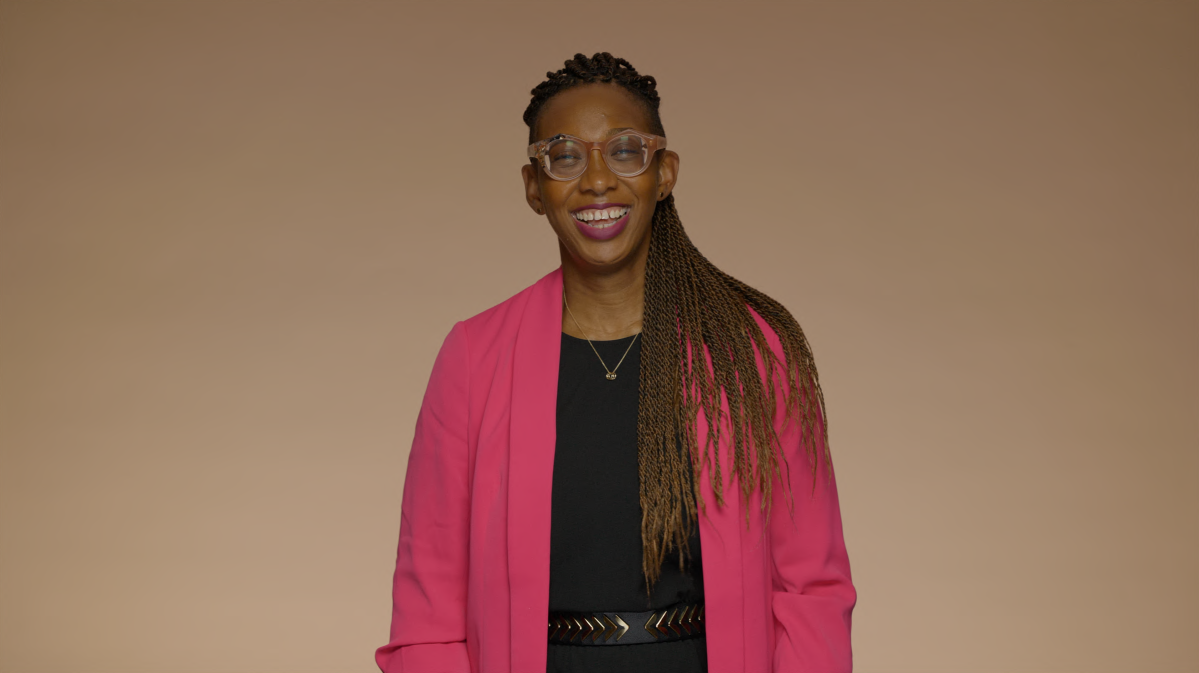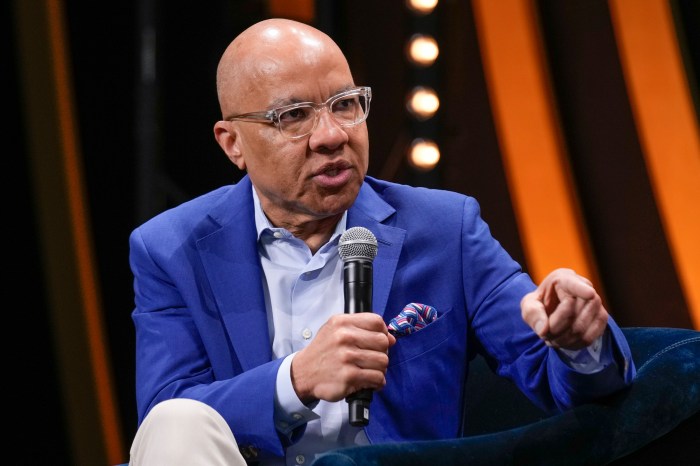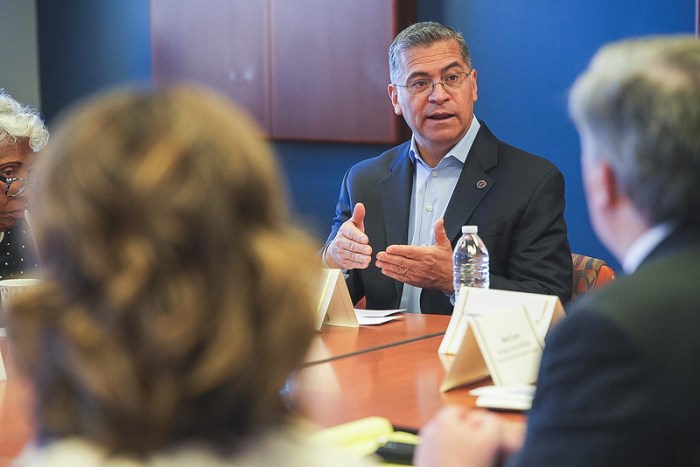International Women’s Day marked Kelley Robinson’s 100th day in office at the helm of the Human Rights Campaign (HRC) and Human Rights Campaign Foundation (HRCF).
Gay City News caught up with Robinson, 36, to discuss what she’s accomplished in her first 100 days on the job and her vision for the more than 40-year-old organization. Robinson said the United States is in an “urgent” moment — a “turning point” in the fight for democracy and freedom.
Robinson, the first Black woman to lead HRC, officially intended to start on November 28, 2022, but the tragic shooting at Club Q in Colorado Springs, Colorado catapulted her into her new position a week early. The action hasn’t stopped since.
That fatal Thanksgiving week, Robinson and her wife, Becky George, Everytown for Gun Safety’s senior advisor for movement building, were busily galvanizing their communities to respond to the “horrific attack,” she said.
“I think the challenge for the rest of my 100 days has been how to turn that devastating moment into meaningful action that can really make a difference,” Robinson said. “It’s been a busy first 100 days.”
Crappy start
Robinson did not mince words. She recognizes that she got a “crappy start” to stepping into leading HRC. Starting with the Club Q shooting, to 2022 being a year of rollbacks on rights, from abortion rights being taken away in many parts of the country in the summer to an unprecedented wave of anti-LGBTQ legislation. The LGBTQ and progressive movements were under attack like never before. Yet, in the overwhelming fury of assaults on the LGBTQ community and progressive movements, Robinson sees the opportunity and she knows what her responsibility to the community is.
Last year was an unprecedented year that set the stage for 2023’s avalanche of anti-LGBTQ bills. In 2023, 380 anti-LGBTQ bills have been introduced in State Legislatures across the country, according to the HRC, and of those bills, 150 specifically target transgender and non-binary people, especially youth. There are 90 “bathroom bills” — proposed laws that block transgender youth from accessing bathrooms based on their declared gender — and last year saw 29 bills signed into law, 17 of which targeted transgender youth.
In February, Robinson warned of the avalanche of anti-LGBTQ legislation that was about to slide across the US’s winter landscape. In a call with reporters on February 14, she described the stack of bills moving swiftly through State Legislatures — especially in Mississippi, Tennessee, West Virginia, and Wyoming.
Within a week, three bills were signed into law in Mississippi (barring gender-affirming care) and Tennessee (banning many drag performances from taking place on any public property in the state and a ban on age-appropriate gender-affirming care for transgender youth under the age of 18), while West Virginia and Wyoming lawmakers have delivered bills to their respective governors that would allow religious-based discrimination and ban transgender students from sports. Legislatures in Arizona, Idaho, Indiana, Kentucky, Montana, and Oklahoma advanced 10 bills allowing outing students at schools to bans of gender-affirming care and sex education.
On June 24, 2022, nearly 50 years after the court gave women the right to abortion in 1973, the Supreme Court overturned Roe v. Wade with its decision in the Dobbs v. Jackson Women’s Health Organization case.
“That is a crappy place to start,” said Robinson, who formerly served as executive director of the Planned Parenthood Action Fund (PPAF), “but the opportunity on the other side of that is to be unapologetic fighting with and for all of our people and really exposing what our opposition is doing.”
She pointed out that the people coming for LGBTQ people are the same people that are attacking reproductive rights and voting rights, calling it an urgent “threat for our very democracy.”
Walk with purpose
Under Robinson’s leadership, HRC swiftly launched into action. On December 14, along with Club Q founding owner, Matthew Haynes, and one of the club’s bartenders, Michael Anderson, Robinson testified before the House Committee on Oversight and Reform about gun violence in America, especially in LGBTQ spaces.
Robinson is taking HRC’s battle to defend LGBTQ rights to each state, diving deep “to fight back every way that we can” and holding political leaders and “every sector of our lives accountable,” she said.
In the face of so many anti-LGBTQ bills at various stages of becoming law, Robinson has traveled to states to support pro-LGBTQ legislation, such as Michigan’s amendment to the Elliott-Larson Civil Rights Act that “explicitly” includes protections for sexual orientation and gender identity.
She also oversaw HRCF’s launch of its 9th annual State Equality Index, which issues a report card for states based on statewide laws and policies that affect LGBTQ and their families, released January 26.
HRC is currently reassessing how it rates and ranks corporations and organizations based on its LGBTQ policies and friendliness, she said.
She isn’t only keeping her eye on lawmakers. Robinson said she called out the New York Times’ reporting and opinion pieces on trans issues, adding her signature onto a letter signed by more than 100 LGBTQ and ally organizations February 15. She also noted that HRC called out the College Board for stripping works of Black authors and scholars associated with critical race theory from Advanced Placement courses February 1.
She took a moment to celebrate the wins, including the 2020 election cycle that ushered in President Joe Biden and Kamala Harris into the White House while Democrats retained a majority in the Senate. She also praised the signing of the Respect for Marriage Act into law, the FDA’s decision to update the rules for gay and bisexual men donating blood, and Michigan’s expansion of civil rights to LGBTQ people.
“We can’t spend time, so much of our effort and movement energy protecting laws, policies, and practices that actually were never good enough in the first place,” she said. “There’s no reason to play small, there’s no reason to be afraid because truly so many of us have nothing else to lose.”
She said she’s “locking arms” with other progressive movement leaders and communities in the gun violence prevention movement, educational equity, and racial justice to fight back.
“People are clear that when they come for one of us, they are actually coming for all of us,” she said.
Vision for the future
It’s not lost on Robinson that she is one of four queer Black women and one nonbinary Black person heading up five of America’s leading LGBTQ organizations. Quoting Lizzo, an American singer and rapper, Robinson said, “It’s about damn time.”
Robinson went on to express that she feels honored and humbled — and she noted that she’s seeing more BIPOC and non-binary queer leaders than she has ever seen before.
“I think that shapes the way that we engage with one another and also ensures that when we talk about intersectionality, it’s not a practice that we learned; this is the way that we have lived our lives and do our work,” she said.
Robinson feels the change coming in her bones and sees it clearly that “we can achieve a world where people are free, liberated, and experiencing joy in a way that that doesn’t have any limits to it,” she said.



































